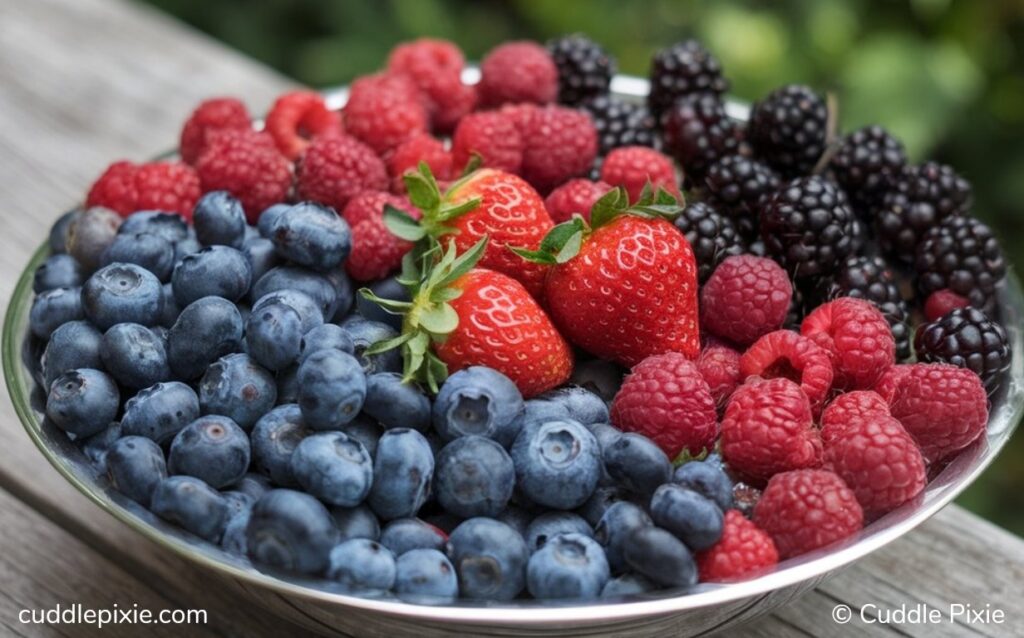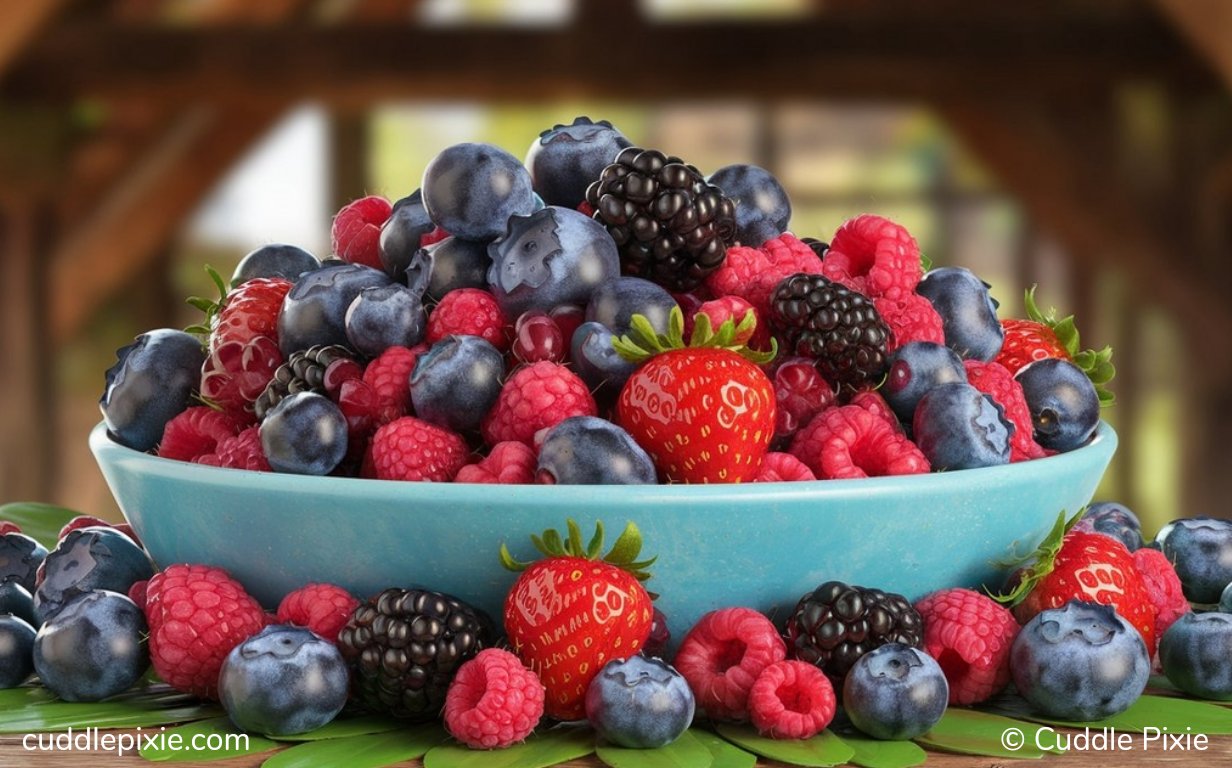As your baby embarks on their exciting journey into solid foods, one group of fruits you’ll want to explore is berries. Berries are vibrant, delicious, and loaded with nutrients essential for your baby’s growth and development. From their immune-boosting properties to their role in brain development, berries are truly a superfood for babies.
In this detailed guide, we’ll cover everything you need to know about introducing berries into your baby’s diet, from when and how to start, to safe serving methods, and even some expert advice on allergies and nutrition. Additionally, we’ll share delicious recipe ideas and tips on how to incorporate berries into your baby’s meals seamlessly.
In This Article
Why Are Berries Good for Babies?
Berries, often referred to as nature’s candy, offer a wealth of health benefits to babies. These tiny fruits pack a big punch when it comes to nutrition. Let’s dive into what makes berries such a great option for your baby.
Nutritional Powerhouse
Berries are rich in essential vitamins, minerals, and antioxidants. Here’s a breakdown of some key nutrients in berries and how they support your baby’s health:
- Vitamin C: Berries are loaded with vitamin C, which plays a crucial role in boosting your baby’s immune system, helping them fight off infections, and promoting healthy skin.
- Fiber: The high fiber content in berries aids digestion and prevents constipation, a common concern when babies start eating solid foods.
- Antioxidants: Berries, particularly blueberries, are rich in antioxidants that protect the body’s cells from damage, supporting overall health, including brain and eye development.
- Vitamin K: This vitamin helps with blood clotting and supports bone health, which is vital for growing babies.
- Manganese: Found in berries like raspberries and blackberries, manganese supports bone development and helps with metabolism.
According to pediatric nutritionist Dr. Sarah Mitchell, “Berries are nutrient-dense and provide a wide range of vitamins and minerals that support your baby’s overall health. They’re especially beneficial for their immune system and digestive health.”
When Can Babies Eat Berries?
The right time to introduce berries to your baby largely depends on their developmental readiness. Most pediatricians recommend introducing berries when your baby is around 6 months old, at the same time you start offering other solid foods.

Signs Your Baby is Ready for Berries
- Can sit upright with minimal support.
- Shows interest in the food you are eating.
- Exhibits the ability to pick up small objects, showing readiness for finger foods.
Important Tip: Always consult with your pediatrician before introducing new foods, especially if your baby has a history of food allergies or eczema. These factors can increase the risk of allergic reactions.
How to Introduce Berries to Babies Safely
When introducing berries to babies, the main concern is making sure they’re served in an age-appropriate, safe form. Berries can pose a choking hazard if not properly prepared. Here’s how you can safely introduce berries based on your baby’s age:
6-9 Months: Start with Purees
At this stage, it’s best to offer berries in the form of a puree. Berries such as blueberries and strawberries can be blended into a smooth puree. This ensures that your baby can swallow them easily.
- How to Prepare: Wash the berries thoroughly, blend them into a smooth consistency, and serve alone or mixed with other fruits or cereals.
- Pro Tip: You can mix berry puree with breast milk or formula for added creaminess and familiarity.
9-12 Months: Move to Mashed and Soft Pieces
As your baby begins to develop more chewing skills, you can start offering mashed or squished berries. For example, you can serve small, soft pieces of strawberries or lightly mashed raspberries.
- How to Prepare: Cut berries like strawberries into small, manageable pieces or mash them lightly. Blueberries can be squashed between your fingers to soften.
- Pro Tip: Combining berries with soft foods like yogurt or oatmeal can create a well-rounded, nutritious meal for your baby.
12 Months and Older: Whole Berries
Once your baby is comfortable with finger foods and has developed sufficient chewing skills, they can start eating whole, soft berries like blueberries, strawberries, and raspberries.
- How to Prepare: Make sure the berries are soft, and offer them whole or halved if they are larger.
- Pro Tip: Freeze fresh berries before serving. They’ll thaw to a slightly softer texture and can be mashed easily.
Can Berries Cause Allergies?
While berries, particularly strawberries, can occasionally cause allergic reactions, they are generally safe for most babies. Introducing berries one at a time, in small quantities, allows you to monitor for potential allergic reactions.
Common Symptoms of Berry Allergies:
- Rash or hives, especially around the mouth.
- Swelling of the face or lips.
- Vomiting or diarrhea.
What to Do: If you notice any allergic reactions, stop serving the berries immediately and consult your pediatrician. While strawberries are more likely to cause allergic reactions, blueberries and raspberries typically have a lower allergy risk.
According to Dr. Maria Johnson, a pediatric allergist, “It’s important to introduce berries in small quantities initially and observe your baby for any adverse reactions. If your baby has eczema or a family history of food allergies, consult your pediatrician before introducing berries.”
Best Types of Berries for Babies
Not all berries are created equal in terms of nutrition and safety for babies. Here’s a look at some of the most popular berries you can introduce to your baby:

1. Blueberries
Blueberries are an excellent first berry to offer your baby. These tiny, blue gems are rich in antioxidants like anthocyanins, which support brain development, and they’re also packed with vitamin C and fiber.
- How to Serve: Start with a smooth puree or mash for babies younger than 9 months. Once they’re older, you can offer whole, squished blueberries.
- Pro Tip: Pair blueberries with iron-rich foods like fortified cereals or spinach. Vitamin C helps boost iron absorption, which is essential for your baby’s growth.
2. Strawberries
Strawberries are vibrant and sweet, making them an attractive option for babies. They’re loaded with vitamin C, fiber, and antioxidants.
- How to Serve: For babies 6-9 months old, puree or mash strawberries. Once they’re older, cut them into small pieces or offer thin slices.
- Pro Tip: Combine strawberries with yogurt for a delicious snack that’s rich in calcium and probiotics, promoting gut health.
3. Raspberries
Raspberries are packed with fiber and vitamin C, but their slightly tart flavor might not appeal to all babies at first.
- How to Serve: Mash raspberries or blend them into a puree for younger babies. Older babies can enjoy soft, whole raspberries.
- Pro Tip: Mix raspberries with sweeter fruits like bananas or apples to balance out the tartness.
4. Blackberries
Blackberries are full of fiber and antioxidants, but they have a tougher skin and larger seeds, which can be harder for babies to manage.
- How to Serve: Offer blackberries only as a smooth puree or mash until your baby is older and can handle more textured foods.
- Pro Tip: Blackberries are delicious when mixed with other fruits in a smoothie or puree.
Creative Ways to Incorporate Berries into Your Baby’s Diet
Now that you know how to introduce berries to your baby safely, here are some fun and nutritious ways to include them in their meals.
1. Berry Purees
Purees are a great way to start. You can make a simple berry puree by blending your choice of berries with water, breast milk, or formula.
Simple Blueberry Puree Recipe:
- ½ cup of fresh or frozen blueberries.
- ¼ cup of water or breast milk.
- Blend until smooth and serve alone or mixed into oatmeal or yogurt.
2. Berry Finger Foods
Once your baby is comfortable with finger foods, you can offer small, soft pieces of berries. Serve them with other fruits or soft foods to create a balanced snack.
Berry and Banana Mash:
- Mash strawberries or blueberries together with soft banana pieces for a nutrient-packed, colorful snack.
3. Berry Smoothies
For babies over 9 months, smoothies are a fun way to combine berries with other fruits and vegetables. Try blending berries with Greek yogurt, bananas, or spinach.
Baby Smoothie Recipe:
- ½ cup of raspberries.
- ¼ cup of plain Greek yogurt.
- ½ banana.
- Blend until smooth and serve in a baby-friendly cup.
4. Yogurt Berry Parfait
Mix mashed or pureed berries with plain yogurt for a tasty and nutritious parfait. This combination offers protein, calcium, probiotics, and essential vitamins from the berries.

Expert Tips for Parents Introducing Berries
Dr. Sarah Mitchell, Pediatric Nutritionist:
“Berries are a fantastic early food for babies. They’re packed with antioxidants and vitamins that support a baby’s overall development. I recommend introducing them gradually, ensuring they’re soft and easy to swallow.”
Dr. Maria Johnson, Pediatrician:
“Parents often worry about food allergies, but introducing berries around 6 months is generally safe. Introducing them early, in small quantities, can also help reduce the risk of allergies over time. Just keep an eye on your baby for any signs of allergic reactions.”
Common FAQs About Berries for Babies
Can I give my baby frozen berries?
Yes! Frozen berries are a convenient and nutritious option. Just thaw them, and they’re ready to be mashed or pureed. They retain most of their nutritional value and can be easier to work with in purees and smoothies.
What are the signs of an allergic reaction to berries?
Look out for symptoms like rash, hives, swelling, vomiting, or diarrhea. If any of these symptoms appear after feeding your baby berries, stop feeding them immediately and contact your pediatrician.
Can I mix berries with other fruits and vegetables?
Absolutely! Berries mix well with a wide variety of fruits and vegetables. Try blending them with bananas, apples, avocados, or even leafy greens like spinach for added nutrition.
Are there any berries to avoid for babies?
Most berries are safe for babies, but be cautious with blackberries and some larger strawberries due to their tougher textures. Ensure they are prepared appropriately to avoid choking hazards.
Final Words
Introducing berries to your baby’s diet opens up a world of sweet, nutritious, and fun possibilities. Whether you’re serving them in purees, as finger foods, or in smoothies, berries can be a vital part of your baby’s nutrition. Their rich content of vitamins, antioxidants, and fiber supports your baby’s overall health, from immune function to brain development.
By introducing berries safely and gradually, you’re giving your baby a delicious start to a lifelong love of healthy, wholesome foods. So go ahead, grab those berries, and enjoy watching your baby delight in their new favorite food!
